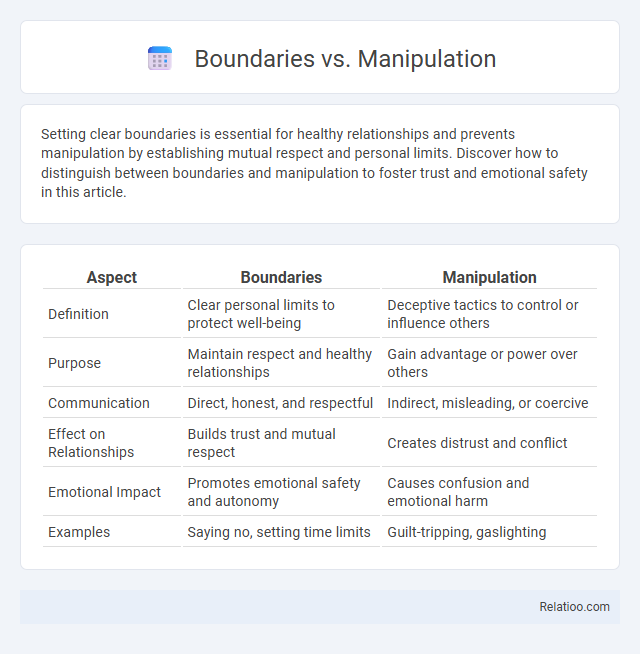Setting clear boundaries is essential for healthy relationships and prevents manipulation by establishing mutual respect and personal limits. Discover how to distinguish between boundaries and manipulation to foster trust and emotional safety in this article.
Table of Comparison
| Aspect | Boundaries | Manipulation |
|---|---|---|
| Definition | Clear personal limits to protect well-being | Deceptive tactics to control or influence others |
| Purpose | Maintain respect and healthy relationships | Gain advantage or power over others |
| Communication | Direct, honest, and respectful | Indirect, misleading, or coercive |
| Effect on Relationships | Builds trust and mutual respect | Creates distrust and conflict |
| Emotional Impact | Promotes emotional safety and autonomy | Causes confusion and emotional harm |
| Examples | Saying no, setting time limits | Guilt-tripping, gaslighting |
Understanding Boundaries: Definition and Importance
Boundaries represent personal limits that define acceptable behavior and protect emotional and physical well-being by clearly communicating needs and limits. Understanding boundaries is crucial to distinguish respectful interactions from manipulation tactics that aim to exploit or control. Effective self-advocacy relies on recognizing and asserting these boundaries to maintain autonomy and prevent exploitation.
What Constitutes Manipulation?
Manipulation involves deceptive or exploitative tactics aimed at controlling or influencing others for personal gain, often undermining their autonomy and trust. Boundaries respect individual limits and communicate personal needs clearly without coercion, while self-advocacy empowers individuals to assert their rights and interests honestly and confidently. Recognizing manipulation requires identifying behaviors such as guilt-tripping, gaslighting, or withholding information to sway decisions unethically.
Key Differences: Boundaries vs Manipulation
Boundaries are clear, respectful limits you set to protect your well-being and maintain healthy relationships, reflecting your personal values and needs. Manipulation involves deceptive or coercive tactics aimed at controlling or influencing others for selfish gain, often undermining trust and autonomy. Understanding these distinctions empowers your self-advocacy by promoting honest communication and reinforcing your rights without exploiting others.
Healthy Boundaries in Relationships
Healthy boundaries in relationships establish clear limits that protect personal values and emotional well-being, fostering mutual respect and trust. Unlike manipulation, which exploits vulnerabilities to control others, self-advocacy involves assertively communicating needs without infringing on others' rights. Maintaining healthy boundaries promotes balanced connections and prevents toxic dynamics by ensuring individual autonomy within interpersonal interactions.
Red Flags: Identifying Manipulative Behavior
Recognizing red flags in manipulative behavior is essential for maintaining healthy boundaries and effective self-advocacy. Common signs include guilt-tripping, inconsistency in communication, and attempts to control your decisions or emotions without respect for your autonomy. Trusting your instincts and clearly asserting your needs helps you protect yourself from being exploited or undermined.
The Psychology Behind Setting Boundaries
Setting boundaries involves recognizing and asserting personal limits to protect mental and emotional well-being, distinguishing this from manipulation which exploits others for personal gain. Psychological research highlights that clear boundaries foster self-respect, reduce stress, and improve interpersonal relationships by promoting honest communication and mutual respect. Self-advocacy complements boundary-setting by empowering individuals to effectively express their needs and preferences without guilt or fear.
How Manipulation Undermines Trust
Manipulation erodes trust by distorting communication and exploiting vulnerabilities, causing confusion and emotional harm. Setting clear boundaries empowers you to protect your well-being and fosters honest interactions. Self-advocacy strengthens relationships by promoting transparency and mutual respect, contrasting sharply with the deceit inherent in manipulation.
Empowering Yourself: Asserting Boundaries
Asserting boundaries is essential for empowering yourself and maintaining healthy relationships. Clear communication of your limits prevents manipulation by others who might exploit ambiguity. Your ability to advocate for your needs fosters self-respect and reinforces your personal autonomy.
Overcoming Guilt and Resistance
Setting clear boundaries protects your well-being without causing guilt, distinguishing your needs from manipulation tactics that seek to control or exploit. Recognizing and confronting guilt triggers enables you to assert yourself confidently through self-advocacy, fostering resilience against resistance from others. Empowering yourself with emotional clarity and communication skills transforms challenges into opportunities for healthy, respectful interactions.
Building Respectful Interactions
Setting clear boundaries establishes a framework for respectful interactions by defining what behavior is acceptable and what is not, fostering mutual respect and understanding. Recognizing manipulation tactics helps you maintain your autonomy and protects your emotional well-being, ensuring interactions remain genuine and fair. Practicing self-advocacy empowers your voice and needs, promoting balanced relationships where respect is consistently upheld.

Infographic: Boundaries vs Manipulation
 relatioo.com
relatioo.com